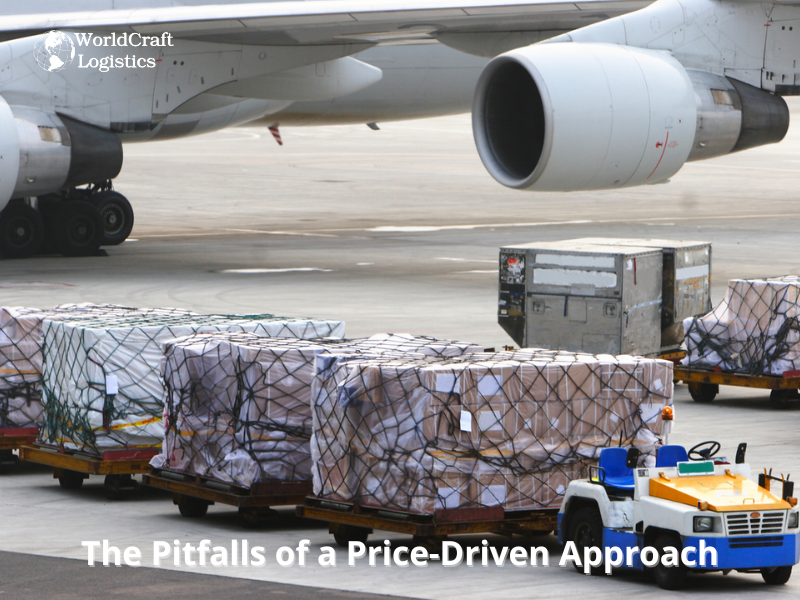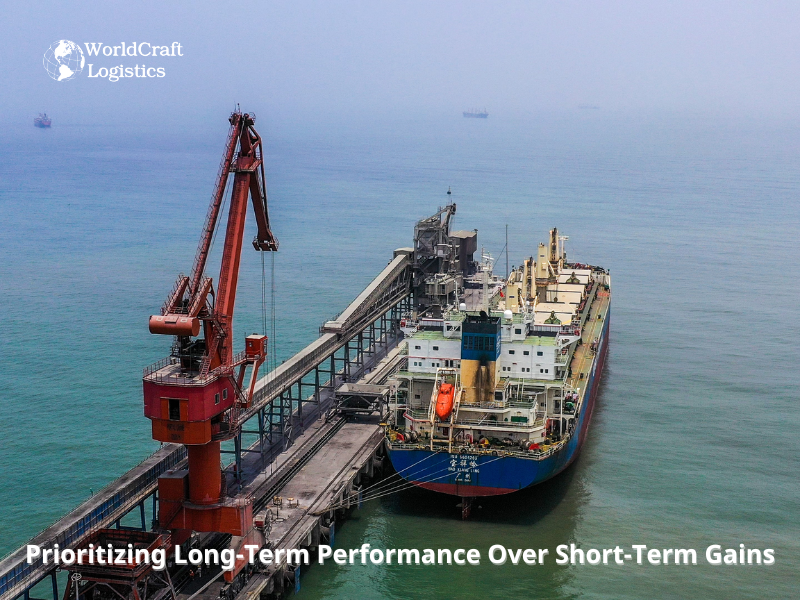
Starting June 1st, 2023 Our warehouse fee will be $0.65/cubic foot per month
In effort to lower the warehouse storage fee during inflation, we have went narrow aisle racking.This construction took us four months but the project is finally completed. With narrow aisle racking, we are able to drop storage by 24%.We as partners will go through this inflation together.
03/17/2025
In an increasingly complex global supply chain, logistics is not just about negotiating lower rates—it's about building resilient, reliable partnerships. Companies that prioritize service reliability over short-term cost savings position themselves for sustainable growth, while those focused solely on cutting shipping expenses often face hidden operational pitfalls that outweigh the initial savings.
As the final link in the supply chain, logistics directly impacts both revenue and operational efficiency. A failure in logistics can have catastrophic ripple effects—delayed shipments, lost customers, and skyrocketing emergency shipping costs. Even a modest 10-15% reduction in shipping rates can be completely negated by lost sales, customer attrition, and unforeseen logistical disruptions, sometimes within a single quarter.

On paper, cost-first logistics decisions might seem like a smart financial move. However, companies that prioritize lower-cost carriers often find themselves burdened with increased costs related to expedited shipping, customer service escalations, and inventory management inefficiencies. These additional expenses frequently outweigh the anticipated cost savings within just a year of making the switch.
Many businesses overlook the broader strategic implications due to a lack of data or market insight. Take, for example, a UK-based retailer convinced they were overpaying their warehouse provider by 20-30%. Though their contract still had over two years remaining, they explored alternative options, fearing that staying the course would be financially unwise. However, after conducting an in-depth review through an RFP (Request for Proposal) process, they discovered that their existing rates were actually competitive with market standards. More importantly, this exercise transformed their provider relationship from a transactional one into a strategic partnership, leading to collaborative efforts in efficiency improvements and long-term growth planning across the UK and Europe.
A successful logistics partnership begins with well-structured service-level agreements (SLAs) that clearly define expectations for both parties. Logistics is an industry where disruptions—from port strikes to extreme weather events—are inevitable. SLAs should be adaptable, reflecting these operational realities while maintaining clear accountability.
The key to a strong SLA is its ability to evolve alongside business cycles. What works smoothly in February may not be effective during peak season. Smart logistics teams establish detailed response protocols and escalation pathways ahead of time, ensuring that service disruptions do not devolve into contractual disputes when time is of the essence.
>>>Read more: What Is SLA? A Complete Guide to Service Level Agreements
Beyond well-defined agreements, successful logistics execution requires a deep understanding of the market landscape. The truckload sector, for instance, is highly fragmented—comprising approximately 580,000 carriers in the United States alone, with most fleets operating fewer than 10 trucks. This market complexity underscores the importance of building stable, predictable shipping patterns.
Reliable volume forecasts and consistent shipping schedules allow carriers to optimize their networks, ensuring that freight is efficiently aligned at both ends of the journey. Shippers who provide steady volume commitments and accurate forecasts tend to outperform competitors who rely on unpredictable, shipment-by-shipment arrangements.
The most successful logistics operations treat their carriers as extensions of their own business rather than just vendors to be squeezed for cost reductions. A well-balanced supply chain ecosystem depends on maintaining strong carrier relationships, ensuring efficient loading and unloading, and fostering consistent, transparent communication.
Experience consistently shows that the lowest price rarely translates into the lowest total cost. Organizations that measure logistics success through service excellence rather than rate negotiation gain a significant competitive edge. By prioritizing predictive capabilities, operational stability, and reliable carrier relationships, companies create a logistics framework that not only enhances customer satisfaction but also drives long-term profitability.

As a leading third-party logistics provider, Worldcraft Logistics LLC. understands firsthand the critical role that service reliability plays in supply chain success. According to industry experts at Worldcraft Logistics, one of the most pressing challenges in logistics today is balancing cost efficiency with service dependability in an era of unpredictable market disruptions.
"Many businesses fall into the trap of selecting carriers based on price alone, only to realize later that service reliability is the true determinant of overall logistics costs," says a senior logistics strategist at Worldcraft Logistics LLC. "We advocate for a strategic approach that blends cost-effectiveness with operational stability, ensuring that our clients achieve both efficiency and resilience."
A key solution, according to Worldcraft Logistics, lies in developing data-driven logistics strategies that leverage predictive analytics for better demand forecasting. Additionally, fostering long-term carrier relationships enables businesses to secure consistent service levels, even during peak seasons or market fluctuations.
Ultimately, the logistics industry is evolving beyond simple cost-cutting measures. Companies that invest in service reliability and strategic carrier partnerships will be best positioned to thrive in an increasingly dynamic global supply chain landscape.
SEO
Digital Marketing/SEO Specialist
Simon Mang is an SEO and Digital Marketing expert at Wordcraft Logistics. With many years of experience in the field of digital marketing, he has shaped and built strategies to effectively promote Wordcraft Logistics' online presence. With a deep understanding of the logistics industry, I have shared more than 500 specialized articles on many different topics.

Hot News
08/05/2024

Hot News
02/23/2023

Hot News
02/23/2023

Hot News
02/06/2023
Hot News
02/07/2023